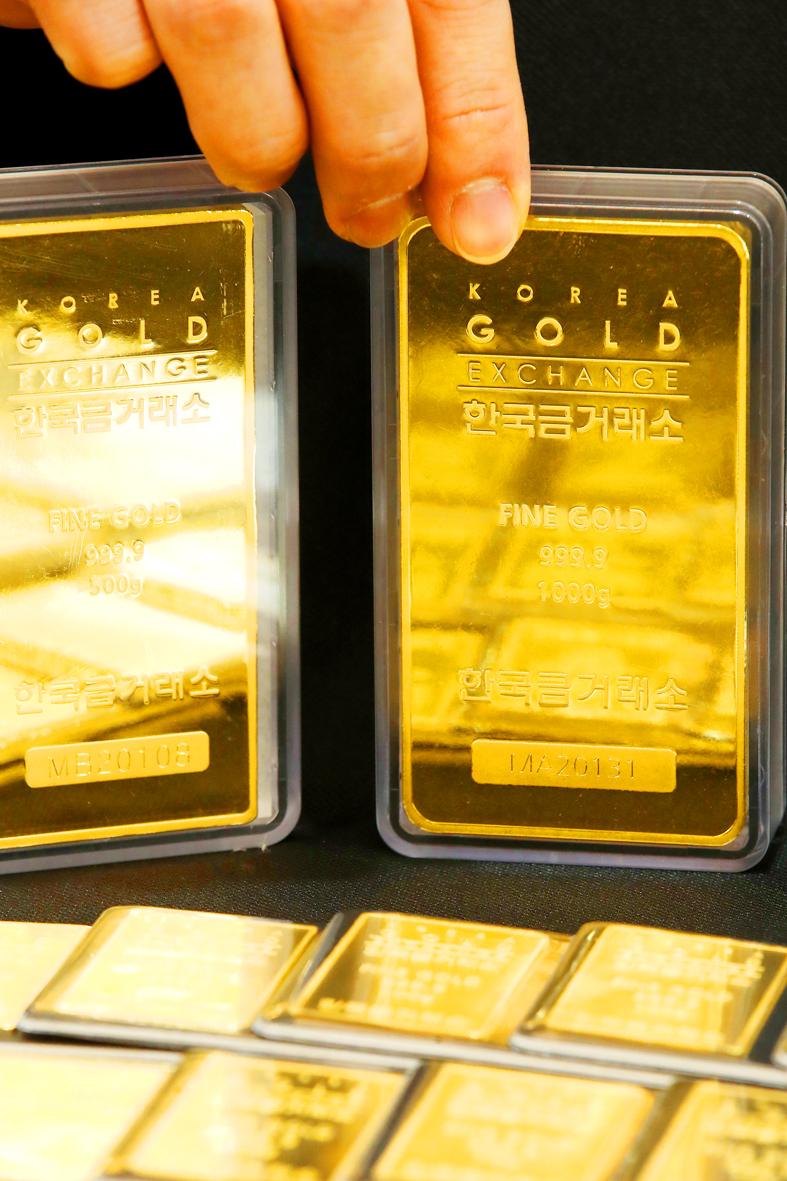Gold is poised to cap the biggest annual advance in a decade after a tumultuous year, with gains last month aided by the US dollar’s decline to the lowest level since April 2018.
Silver has surged almost 50 percent last year.
Bullion in August last year hit a record as investors sought haven assets amid the COVID-19 pandemic.

Photo: EPA-EFE
The surge was buttressed by unprecedented waves of stimulus, including from the US Federal Reserve, which fanned concerns of currency debasement.
Holdings in bullion-backed exchange-traded funds set an all-time high in October last year, although they have since ebbed with the roll-out of COVID-19 vaccines.
Gold, which does not typically offer interest, has benefited as the US central bank cut interest rates to near zero and bought billions of US dollars of bonds every month.
That has helped to drive real interest rates — which reflect expectations for inflation — well below zero.
Led by Fed Chairman Jerome Powell, the US central bank has signaled that its ultra-easy policy would last throughout this year.
“Gold’s main drivers — weaker US dollar and low real interest rates — are likely to provide support” even as vaccines are distributed around the world, Vasu Menon, executive director of investment strategy at Singapore-based Oversea-Chinese Banking Corp, said yesterday in an e-mail.
With the lower-for-longer Fed, “it is too early to throw in the towel on gold,” he said.
Bullion for immediate delivery was 0.3 percent lower at US$1,888.99 per ounce at 12:55pm yesterday in Singapore. That is up 6.3 percent month-on-month and 24.5 percent higher year-on-year, poised for the biggest full-year advance since 2010.
The Bloomberg Dollar Spot Index is heading for a third straight quarterly loss.
Ahead of the new year, some banks have signaled that the traditional haven might now struggle to extend its gains. Gold and other precious metals would likely come under pressure this year as financial markets normalize and the yield curve steepens, Morgan Stanley said in a note last month.
Others have struck a more positive tone.
While bullion’s rally has been blunted by COVID-19 vaccine progress, there is still support from monetary and fiscal policies, HSBC Securities (USA) Inc said.
The incoming administration of US president-elect Joe Biden would likely be gold-positive from a fiscal-spending perspective, it said in a note on Dec. 9.
Spot silver traded at US$26.3869 per ounce, up 48 percent year-on-year. Palladium is on course for a fifth consecutive annual gain, with a rise of more than 20 percent last year.
Platinum has climbed 10 percent year-on-year.

PATENTS: MediaTek Inc said it would not comment on ongoing legal cases, but does not expect the legal action by Huawei to affect its business operations Smartphone integrated chips designer MediaTek Inc (聯發科) on Friday said that a lawsuit filed by Chinese smartphone brand Huawei Technologies Co (華為) over alleged patent infringements would have little impact on its operations. In an announcement posted on the Taiwan Stock Exchange, MediaTek said that it would not comment on an ongoing legal case. However, the company said that Huawei’s legal action would have little impact on its operations. MediaTek’s statement came after China-based PRIP Research said on Thursday that Huawei filed a lawsuit with a Chinese district court claiming that MediaTek infringed on its patents. The infringement mentioned in the lawsuit likely involved

Taipei is today suspending work, classes and its US$2.4 trillion stock market as Typhoon Gaemi approaches Taiwan with strong winds and heavy rain. The nation is not conducting securities, currency or fixed income trading, statements from its stock and currency exchanges said. Authorities had yesterday issued a warning that the storm could affect people on land and canceled some ship crossings and domestic flights. Taiwan Semiconductor Manufacturing Co (TSMC, 台積電) expects its local chipmaking fabs to maintain normal production, the company said in an e-mailed statement. The main chipmaker for Apple Inc and Nvidia Corp said it has activated routine typhoon alert

GROWTH: TSMC increased its projected revenue growth for this year to more than 25 percent, citing stronger-than-expected demand for AI devices and smartphones The Taiwan Institute of Economic Research (TIER, 台灣經濟研究院) yesterday raised its forecast for Taiwan’s GDP growth this year from 3.29 percent to 3.85 percent, as exports and private investment recovered faster than it predicted three months ago. The Taipei-based think tank also expects that Taiwan would see a 8.19 percent increase in exports this year, better than the 7.55 percent it projected in April, as US technology giants spent more money on artificial intelligence (AI) infrastructure and development. “There will be more AI servers going forward, but it remains to be seen if the momentum would extend to personal computers, smartphones and

Catastrophic computer outages caused by a software update from one company have once again exposed the dangers of global technological dependence on a handful of players, experts said on Friday. A flawed update sent out by the little-known security firm CrowdStrike Holdings Inc brought airlines, TV stations and myriad other aspects of daily life to a standstill. The outages affected companies or individuals that use CrowdStrike on the Microsoft Inc’s Windows platform. When they applied the update, the incompatible software crashed computers into a frozen state known as the “blue screen of death.” “Today CrowdStrike has become a household name, but not in